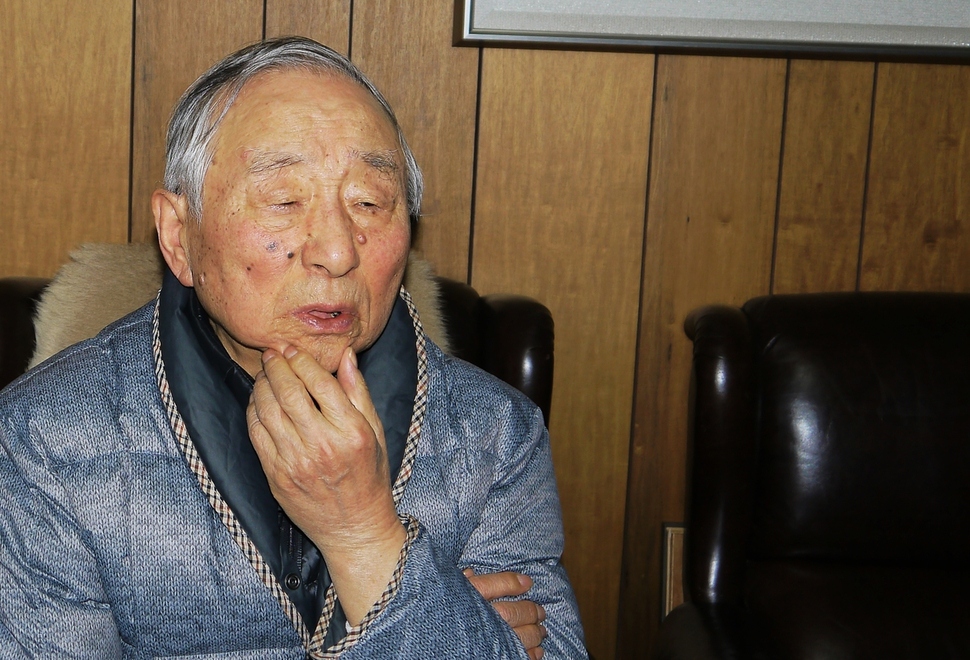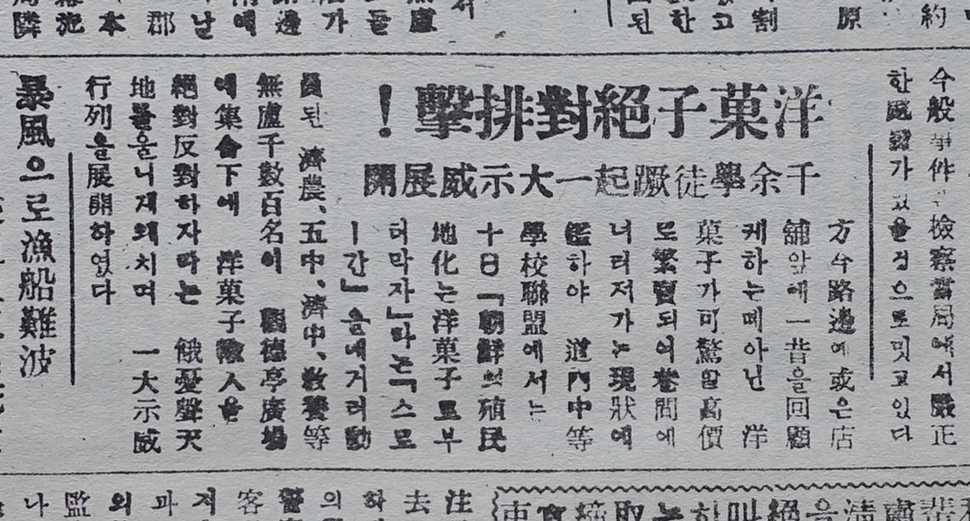 |
|
Hyeon Jeong-seon recalls his role in Jeju’s student demonstrations against the US military administration’s distribution of Western snacks instead of proper rations in the beginning of 1947. (all photos by Huh Ho-joon, Jeju correspondent)
|
A Jeju resident recalls the US military admin’s distribution of Western snacks instead of rations
“Imagine how famished the people of Jeju were at the time of liberation. There wasn’t any food to eat on Jeju Island. We needed the US military administration to give us rations to survive, and what we got from them was Western snacks. So we blocked the chocolate and demanded the distribution of food rations.” The campaign against Western snacks by Jeju students in early 1947 during the US military administration became tied to the issue of food rations, spreading through the island as it met with a positive response from other residents. Hyeon Jeong-seon, one of the main figures in the movement, opened up about the campaign against Western snacks. Now a 91-year-old Tokyo resident, Hyeon, a native of the Jeju village of Hamdeok, was a 20-year-old third-year student at the six-year Jeju Agricultural Middle School at the time. “During the Japanese occupation, students at the agriculture school would go into the farming villages as rice delivery supervision workers and watch their parents and siblings hand over the grains they had worked so hard to produce,” Hyeon explained in a January interview with the Hankyoreh in Tokyo. “Their food was taken away from them, and the residents were starving. It’s because of that experience that I joined the opposition campaign when US snacks began arriving instead of rations after liberation,” he said. “Around ten or so student representatives would travel in trucks. There were representatives from Jeju Junior High and Ohyun Junior High, and I was there as a representative of the agricultural school. In every village, we’d stop the trucks and give speeches holding microphones made of paper. We’d say things like, ‘We are not beggars.’ ‘Let’s stop eating Western snacks.’ ‘Ask for food to eat.’” Even though he’s in his nineties, Hyeon could still clearly recall the experience. Nationally, the snack matter was viewed as a serious domestic economic and social concern for both left and right. Social groups on both sides issued statements in Jan. 1947 to oppose the importation of Western snacks. Calling on the public to stop eating the snacks, they published messages recalling “the ruining experience of eating the jawbreakers that arrived with the ‘New Enlightenment.’” “The US wants to develop Joseon [Korea] into a market for its products. Snack foods may be sweet, they have nothing to do with our prosperity and independence,” one statement said. A student alliance representing secondary schools in Jeju staged a demonstration against snack imports on Feb. 10, 1947, at Gwandeokjeong Pavilion Square in Jeju City, home of the offices of the US military administration in Jeju. “Let snacks be the start to stopping the colonization of Joseon,” went their slogan. A US military intelligence report stated, “Approximately 350 students demonstrated against an MG unit which broke up the demonstration and drove the students from Jeju.” “I was standing at the front when we held the demonstration in front of the US military administration office. The US troops had mounted machine guns on jeeps to threaten us,” Hyeon recalled. “We couldn’t advance any further because they might start firing.” Shortly before the anti-snack campaign, students at Jeju Agricultural Middle School held a joint strike in the second half of 1946 oppose “imperial Japanese holdovers” and “fascism” in education. “We were not on good terms with the students a year ahead of us,” Hyeon said. “The bad habits of the Japanese occupation had been carried over, and they beat the younger students a lot. So we gathered at Sarabong Hill in Jeju City and held the so-called ‘Sarabong meeting,’ where we began our student strike.”
 |
|
An article published in the Feb. 10, 1947, edition of the Jeju Shinbo describing the student movement against Western snacks.
|
 |
|
A US military weekly report from Feb. 16, 1947, describing how US soldiers broke up a student demonstration against Western snacks.
|







